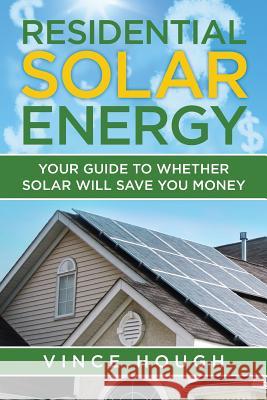Residential Solar Energy: Your Guide to Whether Solar Will Save You Money » książka
Residential Solar Energy: Your Guide to Whether Solar Will Save You Money
ISBN-13: 9781539536703 / Angielski / Miękka / 2016 / 170 str.
Solar energy is the fastest-growing source of clean energy for the home. Driven by a steady decline in the cost of solar energy over the past 10 years, solar panel sales have skyrocketed in the U.S. Today, almost 1,000,000 American homeowners reduce their carbon footprint and fight climate change with solar energy. Most of them are rewarded with significant savings on their home energy bills. Does that mean that you will save money by going solar today? The answer is - it depends The primary determinants of whether you can save money with solar have been your state's solar policy and the solar energy alternative that you pick for your home. Most residential solar sales have taken place in those states that have embraced "solar-friendly" policies. And most solar homeowners have chosen solar systems that they can lease rather than buy, although that may change going forward. Solar energy companies have driven the rapid growth of the residential solar market by installing rooftop solar systems. But since those systems typically generate excess energy during the day (while not producing any energy at night), a means of capturing their excess energy has been needed. And battery storage systems are expensive and can eliminate your potential for solar savings. The solution to this storage problem is to let your power company use your excess solar energy to supply power to its other customers. In return, it provides you with energy credits, which you can draw on when the sun is not shining. In some states, however, how much you are credited for your solar energy has become a contentious issue. While many people think of those rooftop solar systems as the way to go solar, new solar models have emerged. One model, for example, installs solar panels for you at a site remote from your home and credits you for their energy production (known as community or shared solar). Power companies are also experimenting with some other solar models that can generate solar energy for you. As a result, the decision to go solar has become more complex today. In this book, the author shares a range of insights that guide you through the residential solar market. You will learn about the intricacies of solar proposals and the various options that are available to go solar. This guide also provides you with a framework to evaluate those options, so you can see which will save you the most money. This guide's essential information will give you the confidence to make the most informed decision about when to go solar with your home. You'll find this book is your definitive guide on how and when you should go solar.
Zawartość książki może nie spełniać oczekiwań – reklamacje nie obejmują treści, która mogła nie być redakcyjnie ani merytorycznie opracowana.











